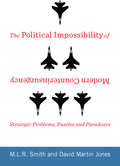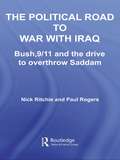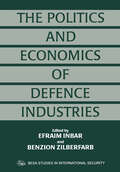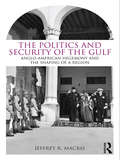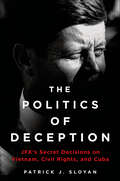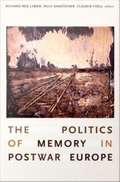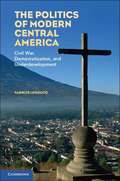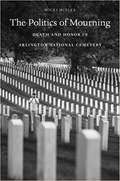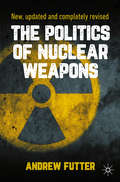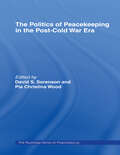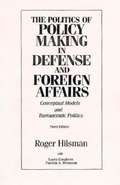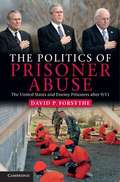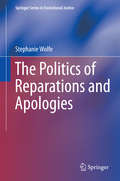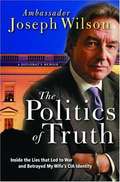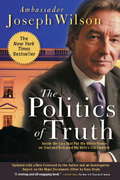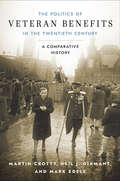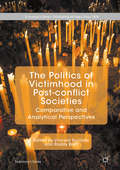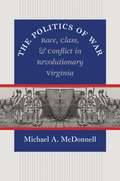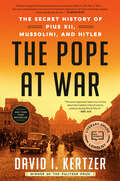- Table View
- List View
The Political Impossibility of Modern Counterinsurgency: Strategic Problems, Puzzles, and Paradoxes (Columbia Studies in Terrorism and Irregular Warfare)
by David Jones M.L.R. SmithThe counterinsurgency (COIN) paradigm dominates military and political conduct in contemporary Western strategic thought. It assumes future wars will unfold as "low intensity" conflicts within rather than between states, requiring specialized military training and techniques. COIN is understood as a logical, effective, and democratically palatable method for confronting insurgency—a discrete set of practices that, through the actions of knowledgeable soldiers and under the guidance of an expert elite, creates lasting results.Through an extensive investigation into COIN's theories, methods, and outcomes, this book undermines enduring claims about COIN's success while revealing its hidden meanings and effects. Interrogating the relationship between counterinsurgency and war, the authors question the supposed uniqueness of COIN's attributes and try to resolve the puzzle of its intellectual identity. Is COIN a strategy, a doctrine, a theory, a military practice, or something else? Their analysis ultimately exposes a critical paradox within COIN: while it ignores the vital political dimensions of war, it is nevertheless the product of a misplaced ideological faith in modernization.
The Political Road to War with Iraq: Bush, 9/11 and the Drive to Overthrow Saddam (Contemporary Security Studies)
by Paul Rogers Nick RitchieThis volume explores in close detail the events and factors leading up to the second Gulf War in 2003 and considers whether war with Iraq was inevitable. Nick Ritchie and Paul Rogers argue that after the election of George W. Bush, conflict between Iraq and the United States was probable, and that after 9/11 it became virtually inevitable. They begin by setting the story of Iraq, Bush and 9/11 within the broader context of the importance of the Persian Gulf to enduring US national security interests and go on to examine the intense politicking that surrounded the conflict and still reverberates today. The authors examine US policy towards Iraq at the end of the Clinton administration, the opposition in Congress and Washington’s conservative think tanks to Clinton’s strategy of containment, and the evolution of Iraq policy during the first eight months of the Bush presidency and the growing pressure for regime change. They also explore the immediate focus on Iraq after the attacks of September 11 that marked a watershed in US national security policy and chart the construction of the case against Iraq through 2002 and the administration’s determination to end Saddam Hussein’s regime at all costs. The Political Road to War with Iraq will be of great interest to all students and scholars of US foreign policy, war and peace studies and international relations.
The Politico-Military Dynamics of European Crisis Response Operations
by Alexander MattelaerHow do Europeans engage in military strategy? Through detailed comparisons of operational planning and exploring the framework of the EU, NATO and the UN, this book sheds light on the instrumental nature of military force, the health of civil-military relations in Europe and the difficulty of making effective strategy in a multinational environment
The Politics and Economics of Defence Industries
by Efraim Inbar Benzion ZilberfarbThis volume provides a policy-relevant analysis of the complex web of contemporary economic trends, political developments and strategic considerations that are shaping the contours of the new post-Cold War world market for weaponry.
The Politics and Security of the Gulf: Anglo-American Hegemony and the Shaping of a Region
by Jeffrey R. MacrisSince the 19th century the Gulf region has been an area of intense interest, having been influenced first by the British and more recently by the Americans. This book charts the changing security and political priorities of these two powers and how they have shaped the region. Adopting a narrative approach, the author provides background history on British involvement from the 19th century and a detailed analysis of the years after the Second World War, when oil supply became more critical. He covers the growth of US influence and the British withdrawal, and follows more recent changes as the US built up its military presence following Desert Storm and the invasion of Iraq. Looking at the three enduring missions fulfilled by the British - maintaining interstate order, protecting the free flow of commerce, which later included petroleum; and keeping out other Great Powers – the book demonstrates how these had by 1991 been assumed almost entirely by the American leaders. A comprehensive and thorough look at the history of the Gulf and the contemporary issues affecting the region, this will be essential reading for students of Middle East history, military history and diplomatic history.Visit the author's website at www.thepoliticsandsecurityofthegulf.com
The Politics and Strategy of Clandestine War: Special Operations Executive, 1940-1946 (Studies in Intelligence)
by Neville WylieThis fascinating new collection of essays on Britain’s Special Operations Executive (SOE) explores the ‘non-military’ aspects of British special operations in the Second World War. It details how SOE was established in the summer of 1940 to ‘set Europe ablaze’, as Churchill memorably put it. This was a task it was meant to achieve by detonating popular resistance against Axis rule, and nurturing ‘secret armies’, which might be capable of providing military and other forms of assistance for British forces when they were once again able to return to the offensive and conduct land operations in Europe. The importance of the collection, however, goes beyond merely illuminating aspects of SOE’s work which have largely been overlooked in previous scholarship. More significantly, by situating SOE within the context of Britain’s broader political needs, the essays demonstrate the extent to which SOE came to epitomise and embody the range of skills that are found in today’s secret service organisations. SOE showed itself capable of operating on a global scale and developing the necessary expertise, equipment and personnel to conduct activities across the whole spectrum of what we have come to know as ‘covert operations’. By bringing SOE’s activities into sharper focus and exposing the scale of its involvement in Britain’s wartime external relations, the essays echo current thinking on the place of the so-called ‘secret world’ in international politics.
The Politics of Deception: JFK's Secret Decisions on Vietnam, Civil Rights, and Cuba
by Patrick J. SloyanInvestigative reporter Patrick J. Sloyan, a former member of the White House Press Corps, revisits the last years of John F. Kennedy's presidency, his fateful involvement with Diem's assassination, the Cuban Missile Crisis and the Civil Rights Movement. Using recently released White House tape recordings and interviews with key inside players, The Politics of Deception reveals:Kennedy's secret behind-the-scenes deals to resolve the Cuban Missile Crisis.The overthrow and assassination of President Diem.Kennedy's hostile interactions with and attempts to undermine Martin Luther King, Jr. Kennedy's secret and fascinating dealings with Diem, General Curtis LeMay, King and Fidel Castro. Kennedy's last year in office, and his preparation for the election that never was.The Politics of Deception is a fresh and revealing look at an iconic president and the way he attempted to manage public opinion and forge his legacy, sure to appeal to both history buffs and those who were alive during his presidency.
The Politics of Industrial Collaboration during World War II
by Talbot Imlay Martin HornDid Ford SAF sabotage the German war effort by deliberately manufacturing fewer vehicles than they could have? Ford SAF claimed after the war that they did. Exploring the nature and limits of industrial collaboration in occupied France, Horn and Imlay trace the wartime activities of Ford Motor Company's French affiliate. The company began making trucks and engine parts for the French military; but from 1940 until Liberation in 1944 was supplying the Wehrmacht. This book offers a fascinating account of how the company negotiated the conflicting demands of the French, German and American authorities to thrive during the war. It sheds important new light on broader issues such as the wartime relationship between private enterprise and state authority; Nazi Germany's economic policies and the nature of the German occupation of France, collaboration and resistance in Vichy France, and the role of American companies in Occupied Europe.
The Politics of Memory in Postwar Europe
by Richard Ned Lebow Wulf Kansteiner Claudio FoguFor sixty years, different groups in Europe have put forth interpretations of World War II and their respective countries' roles in it consistent with their own political and psychological needs. The conflict over the past has played out in diverse arenas, including film, memoirs, court cases, and textbooks. It has had profound implications for democratization and relations between neighboring countries. This collection provides a comparative case study of how memories of World War II have been constructed and revised in seven European nations: France, Germany, Austria, Switzerland, Poland, Italy, and the USSR (Russia). The contributors include scholars of history, literature, political science, psychology, and sociology. Country by country, they bring to the fore the specifics of each nation's postwar memories in essays commissioned especially for this volume. The use of similar analytical categories facilitates comparisons. An extensive introduction contains reflections on the significance of Europeans' memories of World War II and a conclusion provides an analysis of the implications of the contributors' findings for memory studies. These two pieces tease out some of the findings common to all seven countries: for instance, in each nation, the decade and a half between the late 1960s and the mid-1980s was the period of most profound change in the politics of memory. At the same time, the contributors demonstrate that Europeans understand World War II primarily through national frames of reference, which are surprisingly varied. Memories of the war have important ramifications for the democratization of Central and Eastern Europe and the consolidation of the European Union. This volume clarifies how those memories are formed and institutionalized. Contributors. Claudio Fogu, Richard J. Golsan, Wulf Kansteiner, Richard Ned Lebow, Regula Ludi, Annamaria Orla-Bukowska, Heidemarie Uhl, Thomas C. Wolfe
The Politics of Military Coalitions
by Scott WolfordMilitary coalitions are ubiquitous. The United States builds them regularly, yet they are associated with the largest, most destructive, and consequential wars in history. When do states build them, and what partners do they choose? Are coalitions a recipe for war, or can they facilitate peace? Finally, when do coalitions affect the expansion of conflict beyond its original participants? The Politics of Military Coalitions introduces newly collected data designed to answer these very questions, showing that coalitions - expensive to build but attractive from a military standpoint - are very often more (if sometimes less) than the sum of their parts, at times encouraging war while discouraging it at others, at times touching off wider wars while at others keeping their targets isolated. The combination of new data, new formal theories, and new quantitative analysis will be of interest to scholars, students, and policymakers alike
The Politics of Modern Central America
by Fabrice Lehoucq"This book analyzes the origins and consequences of civil war in Central America. Fabrice Lehoucq explains why the inability of autocracies to reform led to the civil wars of the 1980s and why violent conflict led to the unexpected transition to non-military governments in the 1990s. He examines why economic stagnation throughout much of the region, along with unevenness of political reform, has limited democratization. This book also uses these developments to shed light on core debates in comparative politics, suggesting that more progress has been made in understanding the persistence of inequality than in identifying the causes of civil war"--
The Politics of Mourning
by Micki McelyaArlington National Cemetery is America's most sacred shrine, a destination for four million visitors who each year tour its grounds and honor those buried there. For many, Arlington's symbolic importance places it beyond politics. Yet as Micki McElya shows, no site in the United States plays a more political role in shaping national identity.
The Politics of Nuclear Weapons: New, updated and completely revised
by Andrew FutterThis comprehensively updated second edition provides an introduction to the political, normative, technological and strategic aspects of nuclear weaponry. It offers an accessible overview of the concept of nuclear weapons, outlines how thinking about these weapons has developed and considers how nuclear threats can continue to be managed in the future. This book will help you to understand what nuclear weapons are, the science behind their creation and operation, why states build them in the first place, and whether it will be possible for the world to banish these weapons entirely. Essential reading for all students of International Relations, Security Studies and Military History.
The Politics of Peacekeeping in the Post-Cold War Era (Cass Series On Peacekeeping Ser. #Vol. 17)
by David S. Sorenson Pia Christina WoodMost literature on peacekeeping narrowly focuses on particular peacekeeping operations, and the political bargaining between peacekeeping participants. However, there is very little published research on why nations actually commit forces to peacekeeping operations. This new book meets this need.The authors focus specifically on
The Politics of Policy Making in Defense and Foreign Affairs: Conceptual Models and Bureaucratic Politics (Third Edition)
by Roger HilsmanAuthor Roger Hilsman brings to this Third Edition the insight and experience from a lifetime in military and foreign affairs. In the Third Edition of this classic volume, he sets forth a realistic description of how Washington actually works in the making of defense policy and foreign affairs. He achieves this by exploring the various conceptual models and power centers (both individuals and instructions) driving traditional and contemporary defense and foreign policy.
The Politics of Prisoner Abuse: The United States and Enemy Prisoners After 9/11
by David P. ForsytheWhen states are threatened by war and terrorism, can we really expect them to abide by human rights and humanitarian law? David P. Forsythe's bold analysis of US policies towards terror suspects after 9/11 addresses this issue directly. Covering moral, political, and legal aspects, he examines the abuse of enemy detainees at the hands of the United States. At the center of the debate is the Bush Administration, which Forsythe argues displayed disdain for international law, in contrast to the general public's support for humanitarian affairs. Forsythe explores the similarities and differences between Presidents Obama and Bush on the question of prisoner treatment in an age of terrorism and asks how the Administration should proceed. The book traces the Pentagon's and CIA's records in mistreating prisoners, providing an account which will be of interest to all those who value human rights and humanitarian law.
The Politics of Reparations and Apologies
by Stephanie Wolfe The Politics of Reparations and Apologies examines the evolution and dynamics of reparation politics and justice. The volume introduces the key concepts, theories, and terms associated with social movements and in particular, the redress and reparation movement (RRM). Drawing from RRMs that have their foundation in World War II--the German genocides, the United States internments, and the Japanese "comfort women" system-- the volume explores each case study's relative success or failure in achieving its goals and argues that there are overarching trends that can explain success and failure more generally in the RRM movement. Using the backdrop of international criminal law and normative concepts of reparations, the volume establishes and analyzes the roles of reparations and apologies in obtaining transitional justice. In each case study, there is a detailed rundown of the political actions that were attempted to obtain redress and reparation for the victims, of how successful the attempts were, and of the crucial factors which influenced the relative success or failure. Crucially, the volume offers a comparative framework of the actions that contribute to a successful outcome for transitional justice. With the increasing normative expectation of justice in post-conflict situations, this volume is a valuable resource for researchers in international affairs, human rights, political science, and conflict studies.
The Politics of Torture
by Tracy LightcapWhy did it happen? Why did the United States begin to torture detainees during the War on Terror? Instead of an indictment, this book presents an explanation. Crises produce rare opportunities for overcoming the domestic and foreign policylogjams facing political leaders. But what if the projects used to address the crisis and provide cover for their domestic policy initiatives come under serious threat from clandestine opponents? Then the restraints on interrogation can be overwhelmed, leading to the creation ofinformal institutions that allow the official establishment of torture. These ideas are tested using comparative historical narratives drawn from two cases where torture was adopted - the War on Terror and the Stalinist Terror - and one where it was not - the Mexican War. The book concludes with some thoughts about how the United States can avoid the legal establishment of torture in the future.
The Politics of Truth: A Diplomat's Memoir
by Joseph WilsonAmbassador Wilson writes a very engaging memoir of how he wound up in the diplomatic service. We follow his career from support staff overseas, to ambassador of several small African nations. He was also the last charge d'affairs in Iraq after the war began in 1990. He tells the story of how he got tangled up in the hardball and brutal politics of the current Bush administration, and how it differs from the norms of civil discourse in politics, and even from the first Bush administration, which praised Wilson lavishly.
The Politics of Truth: Inside the Lies That Put the White House on Trial and Betrayed My Wife's CIA Identity
by Joseph WilsonOne of last year's most controversial books and a "New York Times" bestseller, with an investigative epilogue by a prominent Washington journalist and a new introduction by the author on the anatomy of the Bush administration's smear campaign against him.
The Politics of Veteran Benefits in the Twentieth Century: A Comparative History
by Mark Edele Martin Crotty Neil J. DiamantWhat happened to veterans of the nations involved in the world wars? How did they fare when they returned home and needed benefits? How were they recognized—or not—by their governments and fellow citizens? Where and under what circumstances did they obtain an elevated postwar status?In this sophisticated comparative history of government policies regarding veterans, Martin Crotty, Neil J. Diamant, and Mark Edele examine veterans' struggles for entitlements and benefits in the United States, the United Kingdom, Japan, Taiwan, the Soviet Union, China, Germany, and Australia after both global conflicts. They illuminate how veterans' success or failure in winning benefits were affected by a range of factors that shaped their ability to exert political influence. Some veterans' groups fought politicians for improvements to their postwar lives; this lobbying, the authors show, could set the foundation for beneficial veteran treatment regimes or weaken the political forces proposing unfavorable policies. The authors highlight cases of veterans who secured (and in some cases failed to secure) benefits and status after wars both won and lost; within both democratic and authoritarian polities; under liberal, conservative, and even Leninist governments; after wars fought by volunteers or conscripts, at home or abroad, and for legitimate or subsequently discredited causes. Veterans who succeeded did so, for the most part, by forcing their agendas through lobbying, protesting, and mobilizing public support. The Politics of Veteran Benefits in the Twentieth Century provides a large-scale map for a research field with a future: comparative veteran studies.
The Politics of Victimhood in Post-conflict Societies: Comparative And Analytical Perspectives (St Antony's)
by Roddy Brett Vincent DruliolleThis volume sheds new light upon the role of victims in the aftermath of violence. Victims are central actors in transitional justice, the politics of memory and conflict resolution, yet the analysis of their mobilisation and political influence in these processes has been neglected. After introducing and explaining the reasons for this limited interest, the book’s chapters focus on a range of settings and draw on different disciplines to offer insights into the interrelated themes of victimhood – victims, their individual and collective identities, and their role in and impact upon post-conflict societies – and the politics of victimhood – meaning how victimhood is defined, negotiated and contested, both socially and politically. Because it outlines a stimulating research agenda and challenges the view that victims are passive or apolitical, this interdisciplinary volume is a significant contribution to the literature and will be of interest to scholars from disciplines such as law, anthropology, political science, human rights, international studies, and to practitioners.
The Politics of War
by Michael A. McdonnellWar often unites a society behind a common cause, but the notion of diverse populations all rallying together to fight on the same side disguises the complex social forces that come into play in the midst of perceived unity. Michael A. McDonnell uses the Revolution in Virginia to examine the political and social struggles of a revolutionary society at war with itself as much as with Great Britain.McDonnell documents the numerous contests within Virginia over mobilizing for war--struggles between ordinary Virginians and patriot leaders, between the lower and middle classes, and between blacks and whites. From these conflicts emerged a republican polity rife with racial and class tensions. Looking at the Revolution in Virginia from the bottom up, The Politics of War demonstrates how contests over waging war in turn shaped society and the emerging new political settlement. With its insights into the mobilization of popular support, the exposure of social rifts, and the inversion of power relations, McDonnell's analysis is relevant to any society at war.
The Politics of War Memory in Japan: Progressive Civil Society Groups and Contestation of Memory of the Asia-Pacific War (The University of Sheffield/Routledge Japanese Studies Series)
by Kamila SzczepanskaSince the 1990s, questions of Japanese wartime conduct, apologies for aggression, and compensation to former victims of the country’s imperial policies, have been brought to the fore of national and regional politics. The state is undoubtedly the most important actor in the process of memory production and along with conservative legislators and the grass-root revisionist movement there has been a consistent trend towards denying or undermining the existing acknowledgments of responsibility for Japan’s wartime past. However, to fully comprehend war memory in Japan, due attention must be paid to competing discourses that demand an alternative view, and only then can the complexity of Japanese war memory and attitudes towards the legacies of the Asia-Pacific war be understood. The Politics of War Memory in Japan examines the involvement of five civil society actors in the struggle over remembering and addressing the wartime past in Japan today. In studying progressive war memory activists, it quickly becomes clear that the apologia by conservative politicians cannot be treated as representative of the opinion of the majority of the Japanese public. Indeed, this book seeks to remedy the disparity between studies devoted to the official level of addressing the ‘history issue’ and the grass-root historical revisionist movement on the one side, and progressive activism on the other. Furthermore, it contributes to scholarly debates on the state of civil society in Japan, challenging the characterisation of Japanese civil society as a depoliticised space by demonstrating a more contentious side of civil society activism. Drawing important new empirical research, this book will be of huge interest to students and scholars of Japanese civil society, Japanese politics, Japanese history and memory in Japan.
The Pope at War: The Secret History of Pius XII, Mussolini, and Hitler
by David I. KertzerNEW YORK TIMES BESTSELLER • &“The most important book ever written about the Catholic Church and its conduct during World War II.&”—Daniel Silva&“Kertzer brings all of his usual detective and narrative skills to [The Pope at War] . . . the most comprehensive account of the Vatican&’s relations to the Nazi and fascist regimes before and during the war.&”—The Washington Post Based on newly opened Vatican archives, a groundbreaking, explosive, and riveting book about Pope Pius XII and his actions during World War II, including how he responded to the Holocaust, by the Pulitzer Prize–winning author of The Pope and MussoliniWINNER OF THE JULIA WARD HOWE AWARD • LONGLISTED FOR THE PEN/JACQUELINE BOGRAD WELD AWARD • ONE OF THE BEST BOOKS OF THE YEAR: The New YorkerWhen Pope Pius XII died in 1958, his papers were sealed in the Vatican Secret Archives, leaving unanswered questions about what he knew and did during World War II. Those questions have only grown and festered, making Pius XII one of the most controversial popes in Church history, especially now as the Vatican prepares to canonize him.In 2020, Pius XII&’s archives were finally opened, and David I. Kertzer—widely recognized as one of the world&’s leading Vatican scholars—has been mining this new material ever since, revealing how the pope came to set aside moral leadership in order to preserve his church&’s power.Based on thousands of never-before-seen documents not only from the Vatican, but from archives in Italy, Germany, France, Britain, and the United States, The Pope at War paints a new, dramatic portrait of what the pope did and did not do as war enveloped the continent and as the Nazis began their systematic mass murder of Europe&’s Jews. The book clears away the myths and sheer falsehoods surrounding the pope&’s actions from 1939 to 1945, showing why the pope repeatedly bent to the wills of Hitler and Mussolini.Just as Kertzer&’s Pulitzer Prize–winning The Pope and Mussolini became the definitive book on Pope Pius XI and the Fascist regime, The Pope at War is destined to become the most influential account of his successor, Pius XII, and his relations with Mussolini and Hitler. Kertzer shows why no full understanding of the course of World War II is complete without knowledge of the dramatic, behind-the-scenes role played by the pope. &“This remarkably researched book is replete with revelations that deserve the adjective &‘explosive,&’&” says Kevin Madigan, Winn Professor of Ecclesiastical History at Harvard University. &“The Pope at War is a masterpiece.&”
